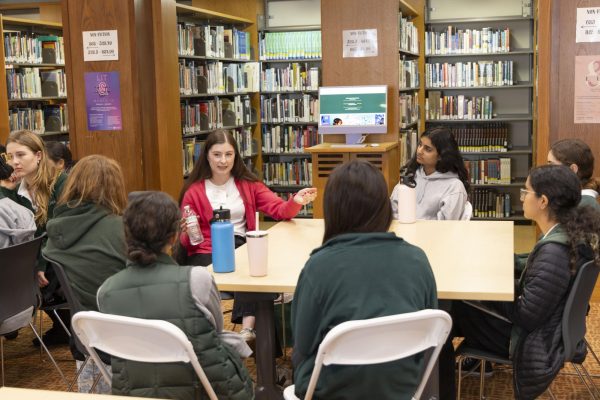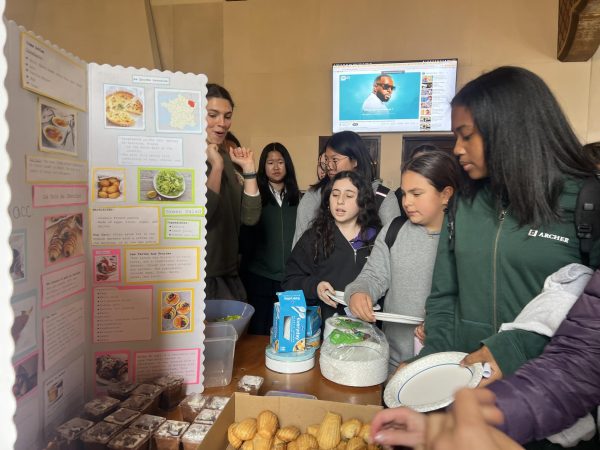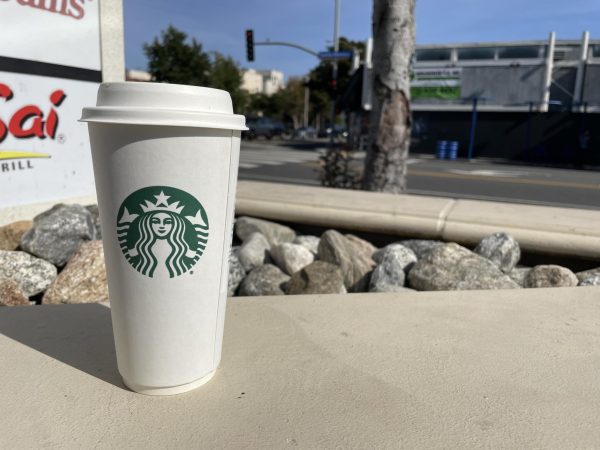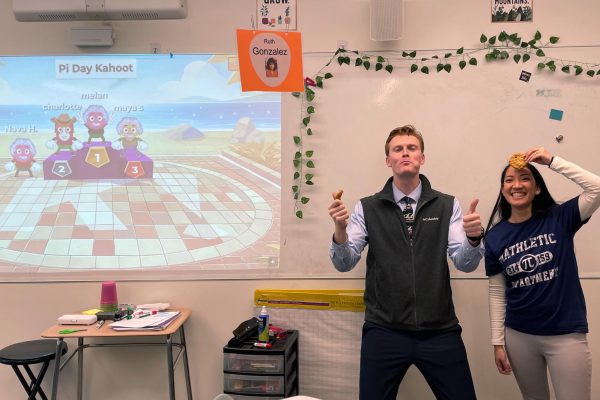Soviet Union exhibit hits its ‘Marx’ with sophomore history class
Photo credit: Nick Graham
A guide explains one of the posters in the exhibit, “Perestroika,” created by Alexander Amelin in 1988, two years before the Soviet Union’s collapse. The poster presents the red silhouette of a pregnant woman marked with the communist symbol. According to the Wende Museum brochure, “the unborn child, designated with the large question mark, highlights the uncertainty [of the future of Russia].”
In the 1950s, the only thing most students were told about the Cold War was to “duck and cover.” In recent years, Russia’s approval ratings in the U.S. have dipped to 36%, the lowest since the USSR was disbanded. However, sophomore world history teacher Nick Graham sought to include the Cold War into his course, called “Questioning the West,” by giving his students a glimpse “behind the Iron Curtain.”
“I was looking for a museum that would explore, in as objective a manner as possible, what life was like on the other side,” Graham said. “That’s pretty much what [The Wende Museum] did. I was thrilled. I thought, ‘This is exactly the kind of thing that can help students understand one of the big questions that we always ask in history, in any subject that we study: What was life like back then?'”
The Wende Museum’s exhibit, which Graham visited with his sophomore class on Tuesday, April 30, focused on dissident voices in the Soviet Union. The exhibit, named “Crumbling Empire,” ran until June 2.
Sophomore Amanda Greene also spoke to the value of the Russian perspective; she said that the exhibit allowed her to critique the Western belief that communism is “100% bad.”
“We’re always taught simple black and white: communism bad, capitalism good,” Greene said. “But then this [exhibit] shows the problems with communism aren’t as obvious as you would think. The art critiques communism in different ways, and it kind of showed that communism itself isn’t bad, it’s just that there’s certain things that come with it that can get messed up. It creates a better ground for us to improve upon ourselves in the future.”
The exhibit mainly consisted of brightly-colored posters, which expressed the grievances of USSR citizens symbolically.
“It’s some of the most modern art I’ve seen,” sophomore Eva Dembo said. “When I first looked at the art, I didn’t really know [what to think]. And then as the guide explained further and further what the work actually meant, I [thought] ‘Oh wow, I did not even see that, and I would never have thought that.'”
Because the students themselves were not alive during the Cold War, witnessing artifacts of the time period was deemed even more “important.”
“[The Cold War] ended in 1990,” Dembo said. “That’s a whole generation that never lived through that, and we missed a huge part of history, which is really crazy. And it’s really interesting how we react to it today, and how we form our political ideas.”
Outside of allowing personal growth, Graham believes that the Cold War and the idea of “mutually-assured destruction” should still be discussed today.
“I’m now asking the question, ‘Did the Cold War ever end?'” Graham said. “People think about the Cold War as a war between the capitalist West and the communist East. Well, that’s one way of looking at it. But then, another way of looking at it is a war between two superpowers: the U.S. and Russia. The U.S. and Russia are not on good terms still to this day. There’s competition for influence. You only have to switch on the news today to see various hot spots around the world, be it Venezuela, be it Syria. There’s a dimension to all of these hot spots where Russian-American rivalry is at play.”
When explaining the pertinence of understanding the Cold War, Graham discussed the ways in which it is perhaps one of the most dangerous in history but also expresses hope for the future.
“Nuclear war — there are no winners,” Graham said. “Let’s face it, it was an event during the Cold War, the Cuban missile crisis, that very nearly wiped out life on Earth as we know it. I’m anxiously watching events as they unfold over time, to see and to hope, that there is a resolution to this.”
Graham saw the trip as a “success,” a statement corroborated by Greene and Dembo.
“It actually went better than I thought it would,” Graham said. “With any trip that you do, you’re always wondering, ‘Are students going to enjoy this?’ And the feedback that I got was overwhelmingly positive. I didn’t see any visible signs of boredom, ennui, disinterest. I actually saw an awful lot of interest. Will I do it again next year? Yes, definitely.”
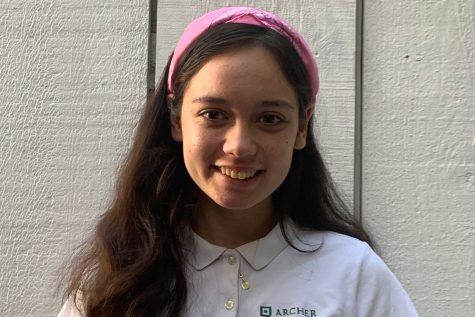
Rio Hundley was involved in the Oracle from 2017-2021. She graduated in 2021. She was promoted to Sports Editor in 2019 and became Features Editor in 2020....



![A guide explains one of the posters in the exhibit, "Perestroika," created by Alexander Amelin in 1988, two years before the Soviet Union's collapse. The poster presents the red silhouette of a pregnant woman marked with the communist symbol. According to the Wende Museum brochure, "the unborn child, designated with the large question mark, highlights the uncertainty [of the future of Russia]."](https://archeroracle.org/wp-content/uploads/2019/05/USSR-900x600.jpg)
